七年级英语下册第二单元知识点归纳Unit2单元归纳知识讲解
七年级下册unit2知识点归纳
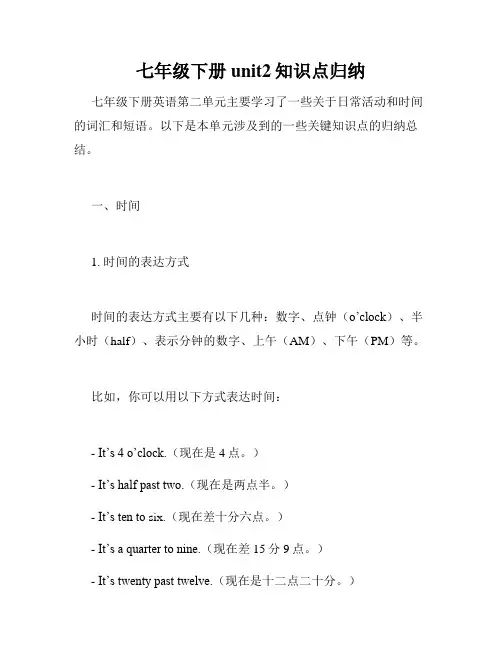
七年级下册unit2知识点归纳七年级下册英语第二单元主要学习了一些关于日常活动和时间的词汇和短语。
以下是本单元涉及到的一些关键知识点的归纳总结。
一、时间1. 时间的表达方式时间的表达方式主要有以下几种:数字、点钟(o’clock)、半小时(half)、表示分钟的数字、上午(AM)、下午(PM)等。
比如,你可以用以下方式表达时间:- It’s 4 o’clock.(现在是4点。
)- It’s half past two.(现在是两点半。
)- It’s ten to six.(现在差十分六点。
)- It’s a quarter to nine.(现在差15分9点。
)- It’s twenty past twelve.(现在是十二点二十分。
)2. 时间的询问与回答询问时间时可以说:What’s the time? 或者What time is it? 等。
回答时就可以用上述时间表达方式进行回答。
二、日常活动在日常活动的学习中,我们需要学会如何表达一些常见的活动和注意事项。
1. 日常活动一些常见的日常活动包括:get up(起床)、havebreakfast/lunch/dinner(吃早饭/午饭/晚饭)、go to school(上学)、do homework(做作业)、watch TV(看电视)等。
2. 注意事项在表达注意事项时,我们需要掌握如何表达禁止和提醒。
比如:- Don’t be late.(不要迟到。
)- Keep quiet in the library.(在图书馆中保持安静。
)三、一般现在时在学习日常活动时,需要掌握一般现在时的用法。
一般现在时用于表示经常性、习惯性或客观事实。
比如:- I go to school by bus.(我坐公交车去学校。
)- He often reads books in the library.(他经常在图书馆看书。
)四、词汇在本单元的学习中,我们也需要掌握一些词汇。
人教版七年级下册英语Unit 2 Where's the post office 单元知识讲解与练习
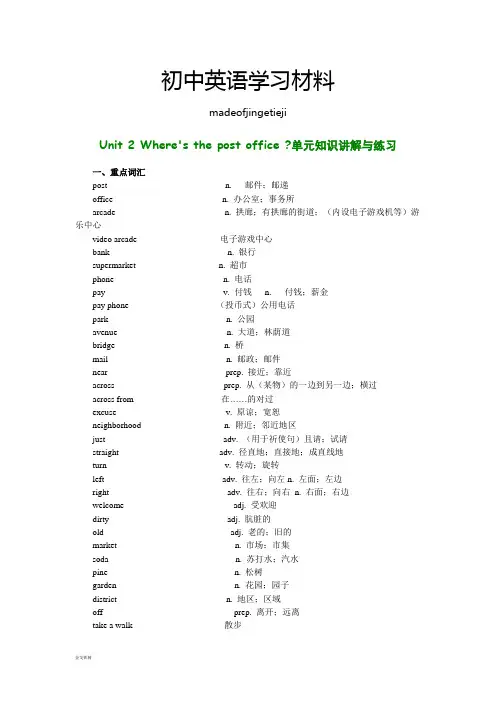
初中英语学习材料madeofjingetiejiUnit 2 Where's the post office ?单元知识讲解与练习一、重点词汇post n. 邮件;邮递office n. 办公室;事务所arcade n. 拱廊;有拱廊的街道;(内设电子游戏机等)游乐中心video arcade 电子游戏中心bank n. 银行supermarket n. 超市phone n. 电话pay v. 付钱n.付钱;薪金pay phone(投币式)公用电话park n. 公园avenue n. 大道;林荫道bridge n. 桥mail n. 邮政;邮件near prep. 接近;靠近across prep. 从(某物)的一边到另一边;横过across from在……的对过excuse v. 原谅;宽恕neighborhood n. 附近;邻近地区just adv. (用于祈使句)且请;试请straight adv. 径直地;直接地;成直线地turn v. 转动;旋转left adv. 往左;向左n. 左面;左边right adv. 往右;向右n. 右面;右边welcome adj. 受欢迎dirty adj. 肮脏的old adj. 老的;旧的market n. 市场;市集soda n. 苏打水;汽水pine n. 松树garden n. 花园;园子district n. 地区;区域off prep. 离开;远离take a walk散步through prep. 穿过;经过pass v. 经过;穿过;通过house n. 房子;住宅beginning n. 开始(的部分);起点tour n. 旅行;旅游;参观;游览visit n. 游览;参观fun n. 娱乐;乐趣if conj. 假使;如果hungry adj. 饥饿的bench n. 长凳;板凳arrive v. 到达;抵达taxi n. 出租车;的士;计程车airport n. 飞机场yours pron. (用在英文信件署名前)你的;你们的二、重点词组post office 邮局Excuse me. (打扰他人,不同意,迫不得已而失礼时的道歉)对不起。
七下英语第二单元笔记
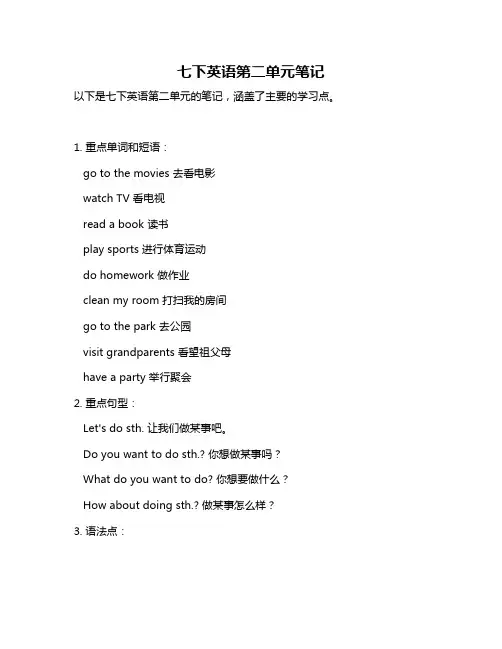
七下英语第二单元笔记以下是七下英语第二单元的笔记,涵盖了主要的学习点。
1. 重点单词和短语:go to the movies 去看电影watch TV 看电视read a book 读书play sports 进行体育运动do homework 做作业clean my room 打扫我的房间go to the park 去公园visit grandparents 看望祖父母have a party 举行聚会2. 重点句型:Let's do sth. 让我们做某事吧。
Do you want to do sth.? 你想做某事吗?What do you want to do? 你想要做什么?How about doing sth.? 做某事怎么样?3. 语法点:现在进行时态(Present Continuous Tense):表示正在进行的动作或正在发生的事情。
结构为“be动词(am/is/are)+动词的现在分词(ing形式)”。
例如:I am watching TV.(我正在看电视。
)动词的ing形式的构成:大多数动词在词尾加“-ing”,如“watching”;以不发音的字母e结尾的动词,先去掉e再加“-ing”,如“reading”;以重读闭音节结尾的动词,如果末尾只有一个辅音字母,应先双写这个字母再加“-ing”,如“running”。
4. 学习建议:结合教材中的对话和活动,多练习使用重点单词和短语,提高口语表达能力。
注意现在进行时态的用法,掌握其基本结构和变体形式,以便在实际语境中运用自如。
除了教材中的例句,可以自己尝试造句,锻炼语言组织能力。
结合个人生活实际,思考自己经常做的事情,用英语表达出来,提高实际应用能力。
人教版初一七年级英语(下)第二单元Unit2知识点+语法整合
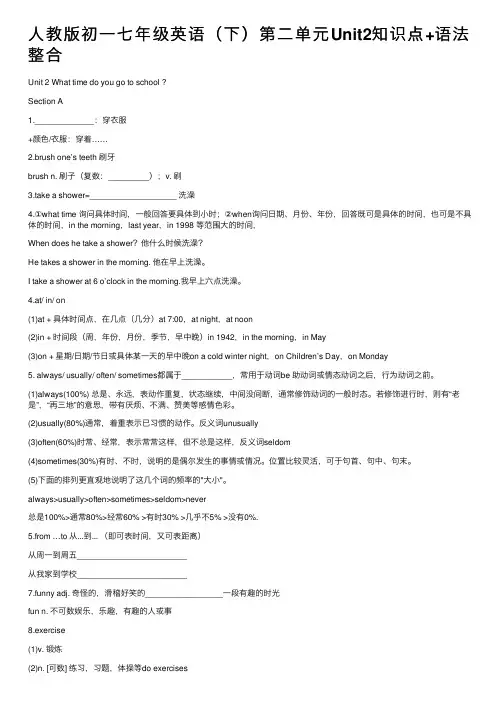
⼈教版初⼀七年级英语(下)第⼆单元Unit2知识点+语法整合Unit 2 What time do you go to school ?Section A1._____________:穿⾐服+颜⾊/⾐服:穿着……2.brush one’s teeth 刷⽛brush n. 刷⼦(复数:_________);v. 刷3.take a shower=___________________ 洗澡4.①what time 询问具体时间,⼀般回答要具体到⼩时;②when询问⽇期、⽉份、年份,回答既可是具体的时间,也可是不具体的时间,in the morning,last year,in 1998 等范围⼤的时间,When does he take a shower?他什么时候洗澡?He takes a shower in the morning. 他在早上洗澡。
I take a shower at 6 o’clock in the morning.我早上六点洗澡。
4.at/ in/ on(1)at + 具体时间点,在⼏点(⼏分)at 7:00,at night,at noon(2)in + 时间段(周,年份,⽉份,季节,早中晚)in 1942,in the morning,in May(3)on + 星期/⽇期/节⽇或具体某⼀天的早中晚on a cold winter night,on Children’s Day,on Monday5. always/ usually/ often/ sometimes都属于___________,常⽤于动词be 助动词或情态动词之后,⾏为动词之前。
(1)always(100%) 总是、永远,表动作重复,状态继续,中间没间断,通常修饰动词的⼀般时态。
若修饰进⾏时,则有“⽼是”,“再三地”的意思,带有厌烦、不满、赞美等感情⾊彩。
(2)usually(80%)通常,着重表⽰已习惯的动作。
Unit2知识点讲解人教版英语七年级下册
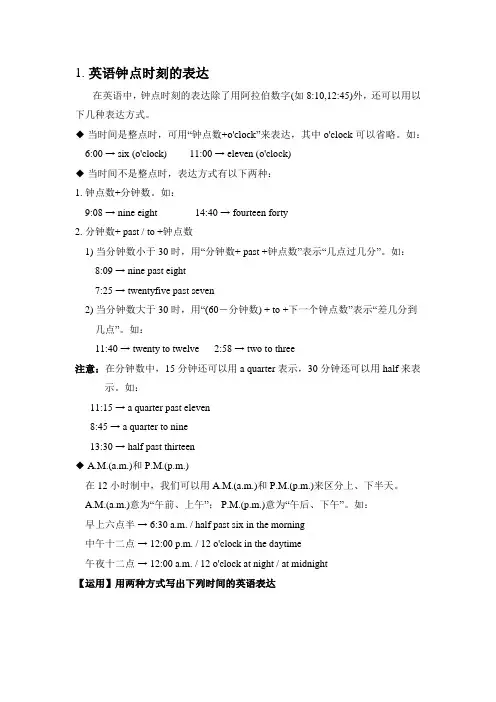
1.英语钟点时刻的表达在英语中,钟点时刻的表达除了用阿拉伯数字(如8:10,12:45)外,还可以用以下几种表达方式。
◆当时间是整点时,可用“钟点数+o'clock”来表达,其中o'clock可以省略。
如:6:00 → six (o'clock) 11:00 → eleven (o'clock)◆当时间不是整点时,表达方式有以下两种:1. 钟点数+分钟数。
如:9:08 → nine eight 14:40 → fourteen forty2. 分钟数+ past / to +钟点数1) 当分钟数小于30时,用“分钟数+ past +钟点数”表示“几点过几分”。
如:8:09 → nine past eight7:25 → twentyfive past seven2) 当分钟数大于30时,用“(60-分钟数) + to +下一个钟点数”表示“差几分到几点”。
如:11:40 → twenty to twelve 2:58 → two to three注意:在分钟数中,15分钟还可以用a quarter表示,30分钟还可以用half来表示。
如:11:15 → a quarter past eleven8:45 → a quarter to nine13:30 → half past thirteen◆ A.M.(a.m.)和P.M.(p.m.)在12小时制中,我们可以用A.M.(a.m.)和P.M.(p.m.)来区分上、下半天。
A.M.(a.m.)意为“午前、上午”; P.M.(p.m.)意为“午后、下午”。
如:早上六点半→ 6:30 a.m. / half past six in the morning中午十二点→ 12:00 p.m. / 12 o'clock in the daytime午夜十二点→ 12:00 a.m. / 12 o'clock at night / at midnight【运用】用两种方式写出下列时间的英语表达1. 2. 3.___________________ 或___________________ ___________________或______________________________________或___________________参考答案1. four thirty; half past four2. eleven five; five past eleven3. nine fifteen; a quarter past nine2. what time & when 引导的特殊疑问句what time和when均可对时间状语进行提问,用来询问什么时间。
【拔高教育】七年级英语下册 unit 2 what time do you go to school短语、语法知识点汇总
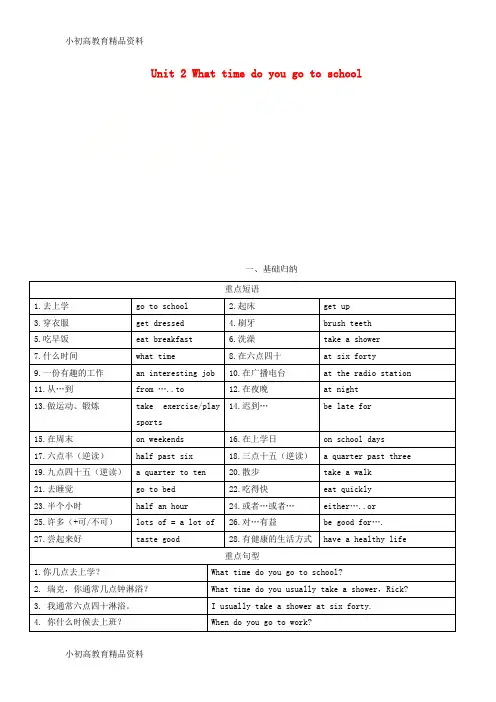
Unit 2 What time do you go to school一、基础归纳【教材内容解析】Section A1.get dressed (P. 7)get dressed意为“穿上衣服”,dress用作动词,表示“给(某人)穿衣服”,接宾语时,只能接表示人的名词或者代词。
He can’t dress himself.I usually dress my daughter before I go to work.【拓展】辨析wear, put on和dress2.take a shower (P. 7)take a shower意为“洗淋浴”,相当于have a shower,shower用作名词,表示“淋浴”。
I often take a shower in the evening.I take a cold shower when I feel tired.3.What time do you usually get up, Rick? (P. 7)(1)what time用来询问具体的时间点,表示“什么时候”。
What time do you go to school?(2)usually是频度副词,意为“通常、一般”,在句中作状语,一般位于实义动词之前,连系动词be、助动词或者情态动词之后。
I usually have lunch at school.He usually goes to school by bike.4.I never get up so early. (P. 8)early此处用作副词,表示“很早地”,反义词为late,意为“晚地”。
Please come to school early tomorrow.【拓展】early还可以用作形容词,表示“早的、提前的”,反义词是late,意为“晚的”。
He gets up early to catch the early bus.5.Scott has an interesting job. (P. 8)job用作可数名词,表示“工作”,强调具体的职业或者工作,work表示“工作”时,用作不可数名词,指人们日常生活和工作中从事的体力或者脑力劳动,及各类工作。
译林版牛津英语七年级下册全册Unit2单元知识点及语法归纳
七年级英语下册知识点总结Unit 2 Neighbours一、重点词组、句型用法一、重点词组、句型用法1. I am afraid they won`t welcome visitors like you.我恐怕他们不会欢迎向你这样的客人。
我恐怕他们不会欢迎向你这样的客人。
be afraid to do sth 害怕去做某事害怕去做某事 be afraid of sth /doing sth.害怕某物/做某事做某事be afraid+(that)从句welcome sb. 欢迎某人迎某人 welcome to sp.欢迎来到某地欢迎来到某地like (prep)像He, _______his elder brother, likes chatting with others. I’m afraid so.恐怕是的。
恐怕是的。
I’m afraid not. 恐怕不是这样的。
恐怕不是这样的。
2.It`s good to live in a neighbourhood like that. 住在那样一个小区很好。
住在那样一个小区很好。
It`s+形容词to do sth3.What are your neighbours like?= How are you neighbours?你的邻居们(性格品质)如何?你的邻居们(性格品质)如何?What be sb/sth like?你认为…怎么样(性格品质)?(用形容词回答)?(用形容词回答)What do/does sb. like?某人喜欢什么?某人喜欢什么?What do/does sb. look like?某人长什么样子(外貌)?4. They often meet at the community centre and share their different skills.different +名词复数名词复数5.Some of them are volunteers.他们中有一些人是志愿者。
人教版七年级下册英语第二单元知识点归纳
人教版七年级下册英语第二单元知识点归纳Unit 2 What time do you go to school?一、词汇与短语◆重点单词◆重点短语◆重点句子◆重点单词变形二、语法知识点A部分知识点1、 whattime/when引导的特殊疑问句在询问时间时,我们一般使用when或what time,表示什么时候或什么时间,他们有时能互相通用,但有些地方是不能通用的,区别很大。
◆问做某事的具体时间点(几点几分),两者可互换。
eg:— What time/when does he get up every morning?他每天早上什么时候起床?—At seven o'clock. 七点钟。
◆问钟表所指的具体时间时,就是问单纯的时间,几点几分,与事无关。
只能用what time。
eg:— Excuse me, what time is it?打扰一下,现在几点了?—It's 1 o'clock. 现在是1点钟了。
◆问事件发生的年份、月份、日期等,非钟点性时间,只能用when。
eg:—When is her birthday?她的生日什么时候?—It's on October 19th. 10月19日◆when可作连词,引导状语从语,“当……的时候”,但what time没有这种用法。
eg:My mother was cooking when I came back2、频度副词❶频度副词的含义:表示次数、频率的副词称为频度副词。
常用的频度副词按频率的高低依次为:always﹥usually﹥often﹥sometimes﹥seldom﹥hardly ever﹥nevereg:John always comes late. 约翰总是迟到。
He hardly ever exercises. 他几乎从不锻炼。
❷表示具体的频率、次数时,一次用once,两次用twice,三次及以上用“基数词+ times”表示。
七年级英语下册第二单元知识点归纳Unit2单元归纳
Unit 2 What time do you go to school 单元归纳短语归纳1.what time 几点2.go to school 去上学3.get up 起床4.take a shower 洗淋浴5.brush teeth 刷牙6.get to 到达7.do homework 做家庭作业8.go to work 去上班9.go home 回家10.eat breakfast 吃早饭11.get dressed 穿上衣服12.get home 到家13.either…or…要么…要么…14.go to bed 上床睡觉15.in the morning/ afternoon/ evening在上午/下午/晚上16.take a walk 散步17.lots of 许多,大量18.radio station 广播电台19.at night 在晚上20.be late for 迟到用法集萃1.at + 具体时间点在几点(几分)2.eat breakfast/ lunch/dinner吃早饭/午饭/晚饭3.take a(n) +名词从事(……)活动4.half past +基数词……点半5. a quarter to +基数词差一刻到……点6.from …to …从……到……7.need to do sth 需要做某事典句必背1. What time do you usually get upI usually get up at six thirty.2. That’s a funny time for breakfast.3. When do students uasually eat dinnerThey usually eat dinner at a quarter to seven in the evening.4. In the evening, I either watch TV or play computer games.5. At twelve,she eats lots of fruit and vegetables for lunch..6. She knows it’s not good for her, but it tastes good.7. Here are your clothes.佳作赏析主题:谈论日常作息习惯写作思路:按照时间顺序记叙一个人的日常作息习惯,必须注意时间的先后顺序,以及时间的表达方式,可以适当运用一些表示频率的副词。
七年级英语人教版下册Unit2重点知识点归纳
人教版七年级英语单元重点知识点归纳Unit2 What time do you go to school?一、重点词组与句子Section A1.what time几点,什么时候2.go to school去上学3.get up起床4.take/have a shower淋浴,洗澡5.put on穿上,增加6.go to work去上班7.get to到达8. an interesting job 一份有趣的工作9.be late for迟到10.have/eat breakfast 吃早餐11.on weekends 在周末12.get dressed = dress oneself穿上衣服13.brush teeth 刷牙14.at a radio station 在广播电台句子:1.What time is it? 几点了?2.What time do you usually get up?你通常几点起床?3.I usually get up at five o’clock. 通常5点钟起床。
4.-What time does he eat breakfast?他什么时候吃早饭?5.-He eats breakfast at seven o’clock. 他七点钟吃早饭。
Section B1.listen to听2.get back 归还,取回3.get home 到家4.get to 到达5.get for 为某人拿(取)买6.half past six 六点半7..get from 从某人/某物那得到……8.go to bed early早睡9.do (one’s) homework做作业10.go home回家11.take a walk 散步12. either…or…要么……要么……13.lots of 许多,大量14.eat dinner吃晚饭15. eat quickly吃的快16 play sports/games 做运动/游戏17. taste good尝起来不错18.healthy activities 健康的活动19. unhealthy habits 不健康的习惯句子:1.When do students usually eat dinner?学生们通常什么时候吃晚餐?2.I don’t have much time for breakfast.我没有许多时间吃早餐。
- 1、下载文档前请自行甄别文档内容的完整性,平台不提供额外的编辑、内容补充、找答案等附加服务。
- 2、"仅部分预览"的文档,不可在线预览部分如存在完整性等问题,可反馈申请退款(可完整预览的文档不适用该条件!)。
- 3、如文档侵犯您的权益,请联系客服反馈,我们会尽快为您处理(人工客服工作时间:9:00-18:30)。
Unit 2单元归纳短语归纳1.what time 几点2.go to school 去上学3.get up 起床4.take a shower 洗淋浴5.brush teeth 刷牙6.get to 到达7.do homework 做家庭作业8.go to work 去上班9.go home 回家10.eat breakfast 吃早饭11.get dressed 穿上衣服12.get home 到家13.either…or…要么…要么…14.go to bed 上床睡觉15.in the morning/ afternoon/ evening 在上午/下午/晚上16.take a walk 散步17.lots of 许多,大量18.radio station 广播电台19.at night 在晚上20.be late for 迟到用法集萃1.at + 具体时间点在几点(几分)2.eat breakfast/ lunch/dinner吃早饭/午饭/晚饭3.take a(n) +名词从事(……)活动4.half past +基数词……点半5. a quarter to +基数词差一刻到……点6.from …to …从……到……7.need to do sth 需要做某事佳作赏析主题:谈论日常作息习惯写作思路:按照时间顺序记叙一个人的日常作息习惯,必须注意时间的先后顺序,以及时间的表达方式,可以适当运用一些表示频率的副词。
例文:My School DayI am a student. I usually get up at seven, and I eat breakfast at seven thirty. Then I go to school at eight. School starts at eight thirty. I eat lunch at twelve. I go home at 17:00. I often eat dinner at 19:00 and then play the piano. I do my homework at 20:00. At 22:00, I go to bed.Unit2 单元测试题Grade________ Name ________Ⅰ.选择填空。
1. ―What's the time? ―_____half past nine. A. Its B. It's C. This is D. They're2. We go to ___ at six thirty in the morning. A. the school B. a school C. school D. schools3. —___ does your mother work? —In a school.A. What B. How C. Where D. When4. —What time is it? —It's ____eight o'clock. A. at B. on C. in D. around5. Do you want to listen to the _____ story?A. funnily B. funny C. funy D. funer6 What time does Jane ______ after school?A. do her homeworkB. does her homeworkC. do her homeworksD. does her homeworks7. I ___ at ten o'clock in the evening.A. have breakfastB. get upC. go to bedD. watch morning TV8.He eats ____ dinner at 7:30 in the evening. A. a B. an C. the D. /9. Please write and tell me ______ your morning. A. for B. to C. about D. of10. ____ Lucy and Lily go home at seven? A. Do B. Does C. Is D. Are11. It's ten o'clock. I must go ____. A. to home B. home C. my home D. his home12. I want to take_________ shower. A. a B. an C. the D. one13. My sister ____ home at 5:00 every day. A. gets B. gets to C. get D. get to14. We can __ No. 5 bus to Tian'an Men Square.A. get B. come C. go D. take15. ---Will you go there by_____train? ----No,, I’ll take ______ taxi.A. /;aB. a;theC./;/D. the;a16We only have h Beijing Opera _____ TV. A. in B. at C. on D. from17. Let’s ______.A. take a shower B. have a shower C. take the shower D. A and B18. My brother ___ the morning TV every day. A. watches B. watch C. watchs D. see19. Do you know__?A. what is his jobB. what does his jobC.what his job does D.what his job is20. He likes ___ the radio(收音机)。
A. listens B. to listen to C. listens to D. to listenII、完形填空Today is Monday (周一). We have a(n) 1 class in the morning. It 2 at 8:30, but I am late (迟到的) for it. I often3 school at about 7:50,4 today I get there late. At about nine o’clock I get to the classroom. I’m really 5 . My English teacher, Miss Green is very kind to me. She 6 me in and doesn’t cri ticize (批评) me. How nice she is!All the students 7 my class like Miss Green. I have many subjects at8 : math, English, P. E., music, 9and computer, but I like English10 . I like my English teacher and I like her classes. I’ll never (不再) get to school la te. I’ll get up very early (早) in the morning.( )1. A. math B. art C. music D. English( )2 A. goes B. starts C. shows D. works( )3. A. learn about B. look at C. get to D. work in( )4. A. or B. and C. after D. but( )5. A. sorry B. exciting C. good D. happy( )6 A. likes B. meets C. lets D. joins( )7. A. on B. in C. for D. about( )8. A. store B. home C. school D. party( )9 A. Chinese B. letter C. festival D. action( )10. A. little B. best C. too D. wellIII、阅读理解 A 难度:★This is Wang Ping’s Day. He’s a young worker. His job is carrying coal (( )1. When does Wang Ping have breakfast? A. At 5:20 in the morning.B. At 5:10 in the afternoon.C. At 5:40 in the morning.D. At 6:00 in the afternoon.( )2. Where does he have his breakfast?A. At home.B. In the coal mine(煤矿).C. In the restaurant(餐馆).D. In the factory (工厂). ( )3. Wang Ping watches news ______.A. over the radioB. on TV in the morning every day D. every morning( )4. Wang Ping goes home _______.A.at 7:40 every eveningB. at 5:20 every eveningC.at 7:30 every morningD. at 5:20 every morning( )5. --- How old is Wang Ping? --- _______.A. A bout 50B. About fifteenC. 25D. We don’t knowB 难度:★★In my family, there are my parents, my grandparents, my brother and I. We are a happy family. My father is a teacher. He works in a school. He gets up early and works very hard every day. Sometimes he helps me with my homework. His students love him very much because he likes to help them. My mother is a writer. She doesn’t need to go to work but she writes books, cleans (打扫) the house and takes care of (照顾) us. My grandparents are old. T hey don’t have jobs. They stay at home every day, reading newspapers (读报) and watching TV. They go to bed early. My brother is a student. He is in my school, too. He likes playing basketball, tennis and ping-pong. I like to play soccer, ping-pong and computer games. After school, we get home early. We do our homework, play sports and help our parents in the evening.( )1. There are ______ people in the f amily.A. five B. six C. seven D. eight( )2. My brother is a ______.A. writer B. runner C. student D. teacher( )3. My mother works ______.A. in a school B. in a hotel C. in a store D. at home( )4. My grandparents ______.A. help us with our homework B. write booksC. don’t have jobsD. don’t like watching TV( )5. My brother and I both (都) like playing ______.A. basketballB. soccerC. tennisD. ping-pongIII 根据句意写单词, 首字母已给出。
